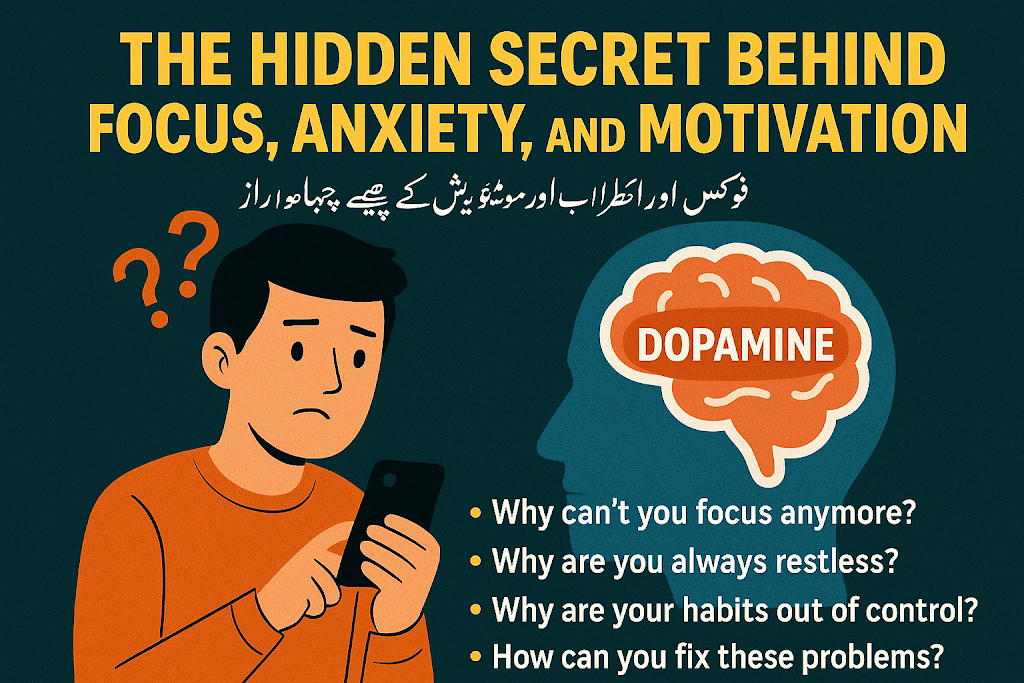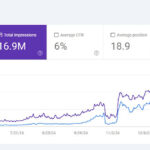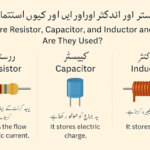Why Can’t You Focus Anymore?
Why Can’t You Focus Anymore?
Why do you keep checking your phone every few minutes?
What’s behind the constant restlessness and anxiety?
How did your habits and decisions slip out of your control?
And most importantly — what can you actually do to fix it?
Let’s uncover a hidden secret inside your brain that explains all of this — Dopamine.
Have you ever wondered why you always want to move forward, achieve more, and learn new things?
Why can’t we just sit peacefully without chasing goals.
That urge to grow comes from a powerful brain chemical called dopamine — and it’s both a gift and a trap.
What is Dopamine?
Dopamine is the brain chemical that drives your curiosity, motivation, focus, and progress.
It’s what makes you feel good when you learn something, finish a task, or achieve a goal.
In fact, it’s one of the things that sets humans apart from animals. it pushes us to grow, improve, and succeed.
How Dopamine Worked in Ancient Times
In the past, life was simple but hard.
Our ancestors had one goal — survive.
Every time they found food, discovered fire, or escaped danger, the brain gave them a dopamine reward:
“This feels good. Do it again.”
Back then, dopamine was a reward for effort.
You had to work hard and be patient before you felt that joy.
Slow Dopamine : The Secret to Real Happiness
Today, we want everything instantly , likes, comments, videos, junk food.
Each gives us a quick dopamine hit, but it doesn’t last.
The real, long-lasting happiness comes from slow dopamine.
That’s the kind you get from exercise, learning, building something, or chasing a meaningful goal.
Slow dopamine makes you stronger, calmer, and more focused.
The Trap of Instant Gratification
Every ping, scroll, and click gives your brain a tiny dose of dopamine.
But the more you chase these quick hits, the less joy you feel.
You become addicted to the next notification, the next scroll, the next “like.”
And slowly, your motivation drops. Your anxiety rises. You feel tired — even after doing nothing.
How Your Brain Balances Pleasure and Pain
Your brain works like a seesaw.
When you chase too much pleasure, it swings the other way and brings discomfort — like stress, tiredness, and low mood.
That’s why you feel anxious and empty after hours on your phone or binge-watching shows.
Real peace comes from balance — from slow, effort-based dopamine.
Willpower Lives in Your Brain
There’s a small part in your brain called the Anterior Mid-Cingulate Cortex.
This little area controls your willpower — your ability to say “no” to distractions.
Like a muscle, it gets stronger every time you resist a quick pleasure and stay focused on your goals.
Dopamine and ADHD
People with ADHD naturally have lower dopamine levels.
That’s why they’re often easily distracted but can also become deeply focused on things they love.
This shows us something powerful:
Even a challenge like ADHD hides a hidden strength — the ability to hyperfocus.
Signs of Low Dopamine
You might have low dopamine if you often feel:
- Tired all the time
- Unmotivated
- Irritable or moody
- Lazy
- Sleep problems
- Addicted to scrolling, sugar, or screens
These signs are your brain’s way of saying, “Something needs to change.”
How to Naturally Boost Your Dopamine (Slowly and Powerfully)
Here’s how to build slow dopamine and feel better long-term:
✅ Cut down on phone use and notifications
✅ Exercise daily (even 15 minutes helps)
✅ Read books or learn new things
✅ Set small, meaningful goals
✅ Wake up early and get sunlight
✅ Spend time in nature
✅ Do something creative
✅ Find your passion — and follow it
These habits take time, but the reward is deep, lasting happiness.
Real Change Comes from Inside
Your life won’t change overnight.
It doesn’t change with luck or by accident.
It changes by the choices you make every single day.
Every time you choose long-term growth over quick pleasure, you become a calmer, happier, stronger version of yourself.
Conclusion: Share and Inspire
If this post helped you understand yourself better — share it.
You never know — your one share might help someone break the cycle and start fresh.
FAQs
Q1: What is dopamine, and how does it affect focus?
Dopamine is a brain chemical that drives motivation and focus. It makes you feel good when you achieve something, which encourages you to try again.
Q2: What causes low dopamine levels?
Too much screen time, junk food, lack of sleep, and no exercise can reduce dopamine — making you feel lazy, anxious, and unfocused.
Q3: How can I increase dopamine naturally?
Build habits like exercising, reading, waking up early, limiting distractions, and working toward goals. These increase slow dopamine that boosts real happiness.
Q4: Is dopamine connected to ADHD and anxiety?
Yes. Low dopamine is linked to ADHD and anxiety. That’s why people with low dopamine may feel restless, easily distracted, or overwhelmed.
Q5: What’s the difference between fast and slow dopamine?
Fast dopamine comes from instant things like social media and junk food. Slow dopamine comes from meaningful, effort-based tasks — and it makes you happier in the long run.



